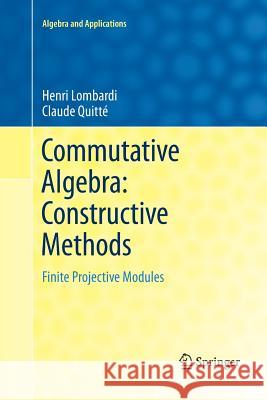Commutative Algebra: Constructive Methods: Finite Projective Modules » książka
topmenu
Commutative Algebra: Constructive Methods: Finite Projective Modules
ISBN-13: 9789402403992 / Angielski / Miękka / 2016 / 996 str.
Kategorie:
Kategorie BISAC:
Wydawca:
Springer
Seria wydawnicza:
Język:
Angielski
ISBN-13:
9789402403992
Rok wydania:
2016
Wydanie:
Softcover Repri
Numer serii:
000324776
Ilość stron:
996
Waga:
1.42 kg
Wymiary:
23.39 x 15.6 x 5.23
Oprawa:
Miękka
Wolumenów:
01











